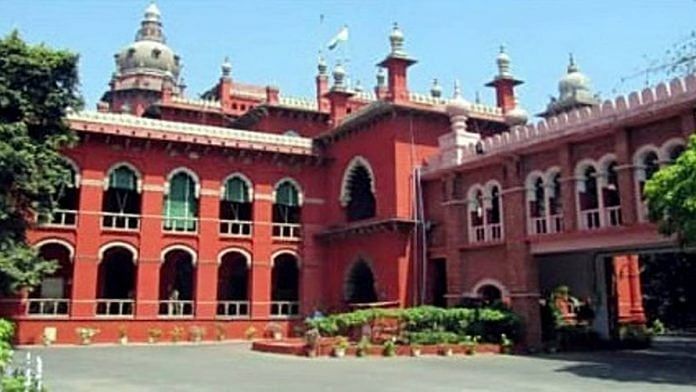
New Delhi: In a ruling that is likely to strengthen the powers of the Enforcement Directorate, the Madras High Court has held that it can appeal against a discharge or acquittal of an accused in a predicate offence, which, according to the law, is the foundation for the ED to register complaints under the Prevention of Money Laundering Act (PMLA). The judgment comes at a time when the anti-money laundering agency has received pushback over its “arbitrary” approach to probing PMLA cases. On 29 October, the Madras HC quashed a lower court order accepting the Tamil Nadu police’s closure report in a 2012 cheating case against lottery king Santiago Martin and other accused, based on which the ED had commenced its anti-money laundering probe.
In its 47-page ruling, a division bench of Justices SM Subramaniam and V Sivagnanam ruled that the PMLA is a “stand-alone” offence, meaning just because a closure report had been filed in a case concerning a predicate or scheduled offence did not mean that the PMLA proceedings will also be automatically cancelled. “Once the ‘proceeds of crime’ is traced out by the Enforcement Directorate and a complaint under PMLA has been filed before the Competent Court, the offence under PMLA has become a stand-alone offence and stand-alone process, which is to be proceeded by following the procedures as contemplated under PMLA,” the bench said. Legal experts said the HC’s ruling contradicts a 2022 Supreme Court judgment that said no action can be brought under the PMLA when one is absolved of the scheduled offences or criminal proceedings by a competent court.
However, the HC held the 2022 judgment does not prohibit the ED from appealing against a discharge, acquittal, or closure of a predicate offence. Also Read: Investigation objective, not subjective: Court raps ED for naming person 1st as witness, then accused The predicate offence, or a scheduled offence, is the underlying crime committed to obtain the “proceeds of crime”. Under Section 30 of the PMLA, parts A, B, and C list the various predicate offences across various statutes, including the Indian Penal Code, the Narcotic Drugs and Psychotropic Substances Act, the Explosive Substances Act, the Unlawful Activities (Prevention) Act, the Arms Act, the Immoral Traffic (Prevention) Act, the Wildlife (Protection) Act, the Prevention of Corruption Act, and even the Copyright Act.
Crucially, to be accused of money laundering under the PMLA, the offence has to be linked to one of the scheduled offences listed under Section 30. Section 3 of the Act defines money laundering as a direct or indirect attempt to indulge or knowingly assist or become party to, or be involved in any activity connected with the crime proceeds, including concealment, possession, acquisition, use, and projecting or claiming it as “untainted property”. Section 4 stipulates a punishment of 3-7 years of imprisonment for the offence.
In the 2022 verdict in the Vijay Madanlal Choudhary case , a three-judge bench of the Supreme Court upheld the constitutional validity of several provisions of the PMLA that were being challenged in the case and the ED’s wide-ranging powers. The bench of Justices A.M.
Khanwilkar, Dinesh Maheshwari and C.T. Ravikumar had pointed out that the Act has several “inbuilt safeguards” that authorised ED officers had to adhere to, such as detailing in writing the reasons for the belief of an accused’s involvement or informing the accused about the grounds of his arrest.
In its 29 October ruling, the Madras HC bench was dealing with a petition filed by the ED that challenged an order by an Alandur court, accepting the November 2022 closure report filed by the Chennai Crime Branch in a cheating case registered against Martin, his wife, and his partners. Accepting ED’s appeal, the HC held that cheating had occurred under Section 420 of the IPC since the accused had amassed money through the sale of illegally printed lottery tickets and by creating false documents in the form of sale agreements. Since certain offences carried out by the accused were predicate offences under the PMLA, the ED sought to expedite the PMLA proceedings by challenging the closure of proceedings in the predicate offence.
The case stems from Rs 7.20 crore in unaccounted cash found at the Chennai residence of Nagarajan, one of Martin’s business partners. Nagarajan claimed the amount was the sale proceeds of the lottery tickets from Kerala and Maharashtra, printed in Calcutta and Faridabad, by his partners, Martin, and him.
Subsequently, a First Information Report (FIR) was registered against the accused under Sections 420 (cheating) and 120B (criminal conspiracy) of the Indian Penal Code (IPC). Given that the offence under Section 420 is a predicate offence, a PMLA case was initiated against the accused. Later, when Martin approached the court for anticipatory bail, he produced a backdated property sale agreement to explain the money.
The court and the authorities eventually discovered that the stamp paper was dated 2 March 2012, even though it was issued and released by the Tamil Nadu government to a stamp vendor on 9 March that year. After finding this discrepancy, the investigating officer filed an alteration report, claiming there had been a fabrication of documents. Nearly ten years later, in November 2022, the TN police filed a closure report in the case.
The report was accepted by the Alandur court on 17 November 2022. This is what the ED challenged in the high court. The two-judge Madras HC bench observed that the PMLA’s object was “crystal clear” from the day of its inception, which is to “protect the economic strength of our great nation” and the interest of the common man.
Recalling the SC’s Vijay Madanlal ruling, the HC said that it “should be read only in the context of what is decided in the said case”. Emphasising that the 2022 judgement should not be “read as a statute”, the court said that it doesn’t state that once there is an acquittal, discharge or quashing of a predicate offence, the ED cannot question the orders of the lower court before a higher court. “There is no such absolute restraint in the judgment in Vijay Madanlal Choudhary’s case.
There is no such bar. On the contrary, in paragraph 290 of the judgment, the Hon’ble Supreme Court has recognised the rights of Enforcement Directorate to work out the remedies as per law,” the Madras High Court said. Adding that the consequent implementation of the law “should be in tandem” with its legislative intent, the court said, “abuse of the law will fracture the bones of PMLA” leaving it “wholly ineffective”.
Laws such as PMLA must be handled with caution, without injuring any vital parts of Part III of the Constitution, which deals with fundamental rights, it said, adding that the PMLA’s successful functioning rests on the investigating agencies. “Both the State and Central Investigating Agencies need to work in tandem to ensure smooth functioning of PMLA,” it added. The court also said that initiation of PMLA proceedings requires a predicate offence.
While a complaint is pending under the PMLA, if the predicate offence is closed, it would result in the “miscarriage of justice”, the court said, adding that the ED was well within its rights to file its plea before the Madras HC, challenging the closure report filed in this case. It also pointed out that the chronology of litigation, in this case, revealed a “schematic approach” by the accused to escape from the clutches of the PMLA proceedings. Adding that the state agency had attempted to bury the predicate offence “in a suspicious manner” and “on extraneous considerations”, which were visible through their actions like the closure report filed by the state police, the court directed the ED and the state investigative agencies to proceed with the case, according to the law.
“The recent order by the Madras High Court contradicts established legal principles that distinguish jurisdictional police investigations of scheduled offences from the Enforcement Directorate’s role in probing money laundering—a derivative offence dependent on the outcome of the scheduled offence,” senior advocate Vikas Pahwa told ThePrint. By treating money laundering as a standalone offence, the court “erroneously permitted the ED to challenge the scheduled offence investigation, effectively granting it the status of an aggrieved party—contrary to precedent”, Pahwa added. “Under Section 44 of the PMLA, separate trials are mandated for scheduled offences and money laundering offences.
Permitting the ED to interfere in scheduled offence investigations risks a miscarriage of justice and disrupts the independence of proceedings intended to remain mutually exclusive, potentially setting a precedent for jurisdictional conflict,” he said. (Edited by Sanya Mathur) Also Read: Can incriminating statements by PMLA accused in one case be used in another? What SC said var ytflag = 0;var myListener = function() {document.removeEventListener('mousemove', myListener, false);lazyloadmyframes();};document.
addEventListener('mousemove', myListener, false);window.addEventListener('scroll', function() {if (ytflag == 0) {lazyloadmyframes();ytflag = 1;}});function lazyloadmyframes() {var ytv = document.getElementsByClassName("klazyiframe");for (var i = 0; i < ytv.
length; i++) {ytv[i].src = ytv[i].getAttribute('data-src');}} Save my name, email, and website in this browser for the next time I comment.
Δ document.getElementById( "ak_js_1" ).setAttribute( "value", ( new Date() ).
getTime() );.













